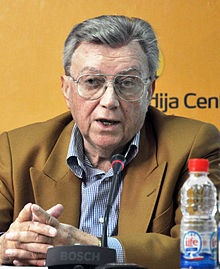Borisav Jović
| Borisav Jović | |
|---|---|

Jović in 2009
|
|
| 13th President of the Presidency of Yugoslavia | |
|
In office 15 May 1990 – 15 May 1991 |
|
| Prime Minister | Ante Marković |
| Preceded by | Janez Drnovšek |
| Succeeded by | Sejdo Bajramović (Acting) |
| 12th Secretary General of Non-Aligned Movement | |
|
In office 15 May 1990 – 15 May 1991 |
|
| Preceded by | Janez Drnovšek |
| Succeeded by | Stjepan Mesić |
| 3rd Serbian Representative in the Yugoslav Presidency | |
|
In office 15 May 1989 – 15 June 1992 |
|
| Preceded by | Nikola Ljubičić |
| Succeeded by | Post abolished |
| Personal details | |
| Born |
19 October 1928 Nikšić, Batočina, Kingdom of Serbs, Croats, and Slovenes |
| Political party |
League of Communists of Serbia (19??–1990) Socialist Party of Serbia (1990–present) |
Borisav Jović (Serbian Cyrillic: Борисав Јовић, pronounced [jǒːʋit͡ɕ]; born 19 October 1928) is a former Serbian communist politician, who served as the Serbian member of the collective presidency of Yugoslavia during the late 1980s and early 1990s. He graduated from the University of Belgrade's School of Economics.
Jović was a close ally and advisor of Serbian official Slobodan Milošević during the 1980s and 1990s, and helped Milošević attain power during the anti-bureaucratic revolution in Serbia. He served as chairman of the presidency of Yugoslavia from May 1990 to May 1991. In his book, Poslednji dani SFRJ (Belgrade, 1995), Joviċ describes how in late June 1990, following the electoral victory in Slovenia and Croatia of pro-independence forces, he proposed to Milošević and federal defense minister Veljko Kadijević that they "throw Slovenia and Croatia out of Yugoslavia" through the use of force, while retaining hold of Serb-populated sections of Croatia, to which Milošević agreed.
Shortly after that meeting Jović began implementing the strategy that led to the end of the federal Yugoslav state. Jović is perhaps best known for helping to negotiate the Brioni Accord in early July 1991, which gave Slovenia its independence after the Ten-Day War.
Near the end of his mandate in the rotating presidency, his successor, Stjepan Mesić, a Croat, was blocked from taking the presidency by four out of eight members of the presidency who thus violated the constitutional arrangement for rotation. In mid-1991, with the tensions leading to the Croatian War of Independence rising in Croatia, he attempted to enact emergency powers to the Yugoslav People's Army which would effectively enable the army to take control of the country and reverse the effects of the first free democratic elections which had elected independence-advocating governments in the republics of Croatia, Bosnia and Herzegovina, Macedonia and Slovenia, leaving only Serbia and Montenegro committed to union. A vote of 5 out of 8 members of the Presidency were required, and Serbia had under its political control votes of Serbia, Montenegro, Vojvodina and Kosovo and presumed that the Serb delegate representing Bosnia and Herzegovina would vote for the plan. The plan backfired, however, because the Bosnian Serb delegate, Bogić Bogičević, refused to vote for the plan.
...
Wikipedia
